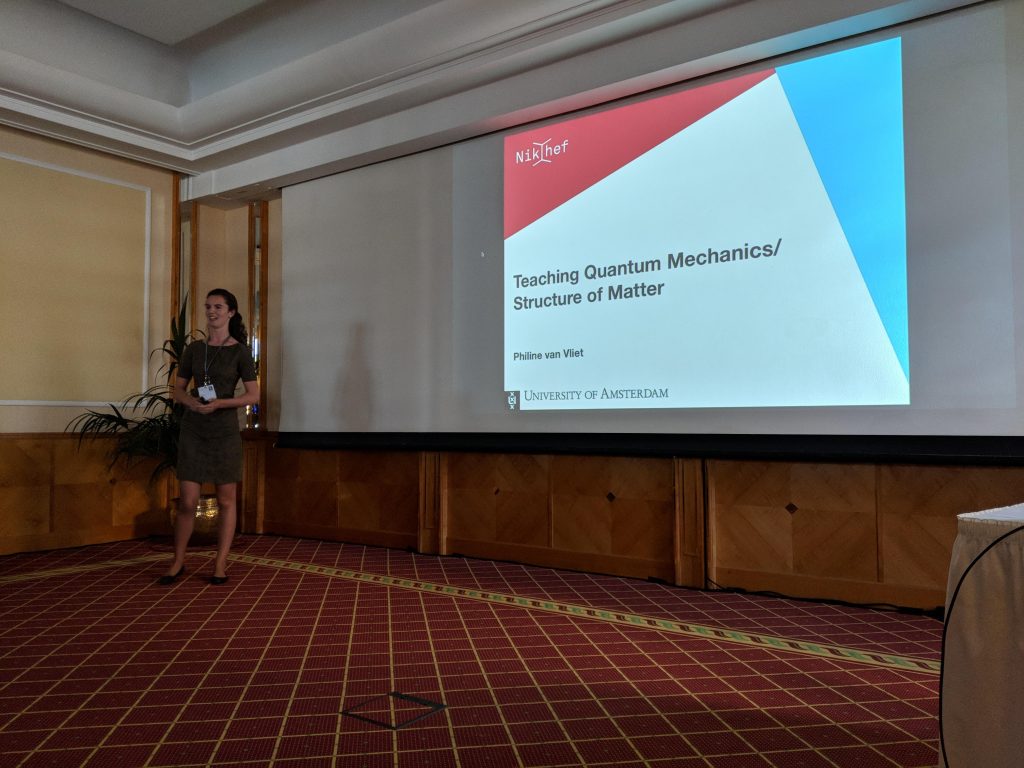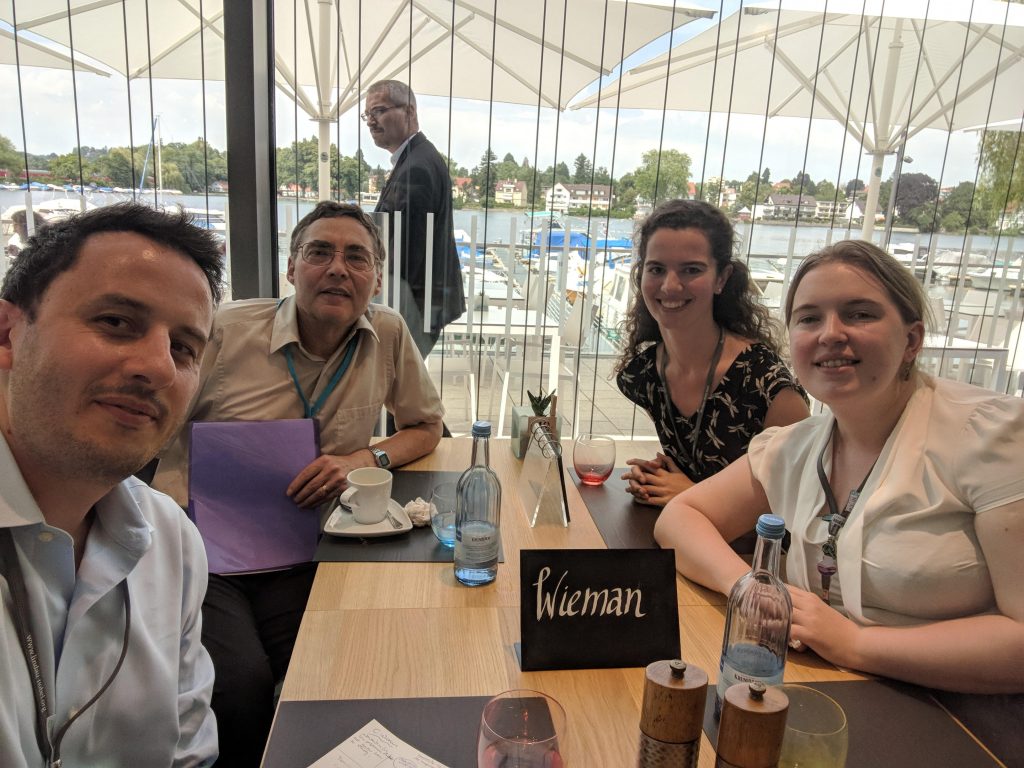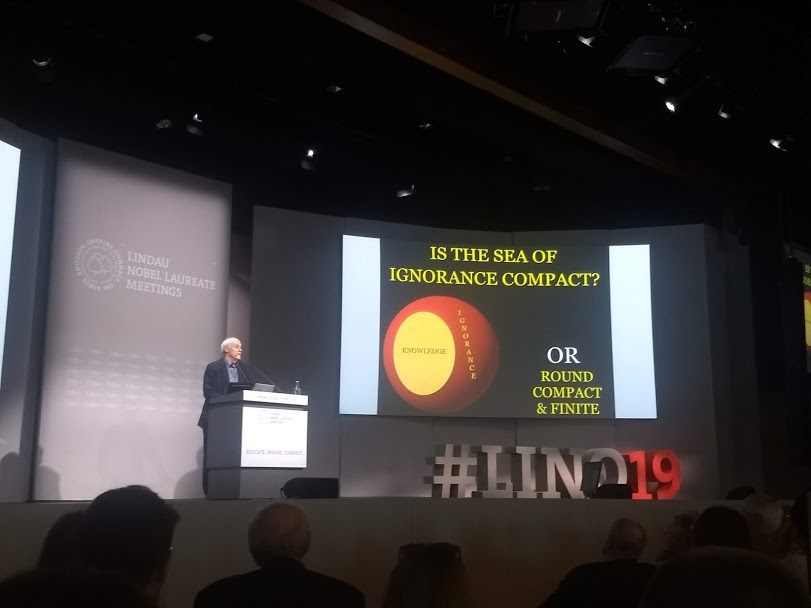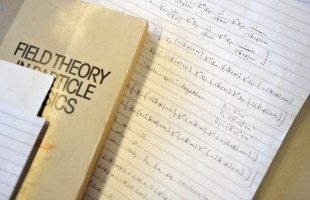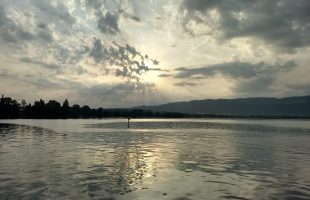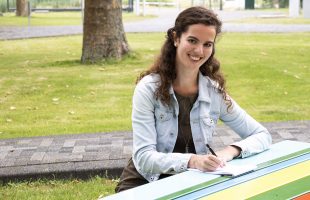I’m Philine van Vliet, a master student in Theoretical Physics at the University of Amsterdam. I am currently finishing my master thesis in the Theory group at Nikhef, about Flavour Physics and CP Violation, under the supervision of Robert Fleischer. From 30-06 to 05-07, I’ll attend the Lindau Nobel Laureate Meeting in Physics, where 600 young physicists have an opportunity to interact with 40 Nobel laureates, to talk about science, life, and careers. I will write about my experiences in a short blog, sharing interesting physics, life-changing advice and other juicy stories. For more information about the event, photos, and recordings of the talks, see also https://www.lindau-nobel.org.
And all of a sudden, we have arrived at the second-to-last day of the conference. I would not have mind spending yet another week, or maybe a month, listening to all the interesting physics, life paths and advice of the Nobel Laureates. Yesterday, Wednesday, was particle physics day, with lots of interesting ideas, but let me not skip Tuesday!
Having heard about (laser)light on Monday morning, on Tuesday we turned to the dark side of physics: gravitational waves. Joseph Taylor took us back in time to the early days of Einstein’s theory of General Relativity. The equations of General Relativity, for a certain stress-energy tensor, have wave-like solutions, implying the existence of gravitational waves. In those days, people were fervently debating whether these waves were physical, ripples in spacetime, or not. Taylor showed some quotes from different papers, answering the question: do gravitational waves exist? They were: “Yes”, “It is a possibility”, “These are not a physical solution (so: no)”, and some other variations. Interestingly, all these quotes came from papers written by Einstein himself. Of course, now we have even detected them, with great effort, as was demonstrated in the next talk by Rainer Weiss.
The panel discussion afterwards continued with discussions on dark matter and dark energy, which make up most of our Universe, while ordinary matter is only about 4%. The terms “dark matter” and “dark energy” may sound mysterious and exotic, but, as was pointed out by the panel, many things were called “dark” before they were discovered, it is simply a name for the yet unknown. David Gross (‘I’m an optimist’) was not too worried about the lack of results from dark matter experiments so far: before a discovery, there is always a lack of results. There is still enough parameter space left to explore.
Unfortunately, I could not stay ‘till the end, as we had to prepare for the masterclass by Carl Wieman. As I walked into the room and saw all the chairs lined up, I realized that 100 people is quite a lot. I don’t think I have ever been so nervous before a presentation before. Each presentation (three in total) by us was followed by a discussion in the audience about the good and lesser aspects of the presented teaching method, summarized and commented on by Wieman in the end. In the end, there was absolutely no need for all the nerves. The talks were very diverse, about teaching a course on nuclear weapon detection, incorporating experiments and demonstrations in lectures, and my own talk about teaching Quantum Mechanics/Structure of Matter, combining theory and experiment in one course. The discussions afterwards were lively and a lot of good points were raised: the importance of keeping students engaged, the difficulty of adapting classes to a large group of students, and making sure students do not forget everything they have learned in a course the day (or hour) after the exam, building upon the knowledge they already have.
Wednesday morning was the morning of Martinus Veltman, Carlo Rubbia, and David Gross. They went from the past, Veltman giving an overview how they came to a renormalizable theory of electroweak interactions to the present, Gross talking about quark confinement and string theory, to the future, Rubbia talking about muon colliders, which would only need to be about a 100 meters in circumference (the LHC is 27 kilometers). Although Veltman’s talk was titled ‘The Future of Particle Physics’, he did not want to make any predictions, since the future is completely unknown. When asked what kind of experiment or detector he would like to see next, he turned to Carlo Rubbia and asked: “What are you currently working on?”.
David Gross also did not like to make predictions about the future and left it to the young people to look in new directions. The one question he really wants an answer to is what happened at the exact beginning of the Universe, what were the initial conditions. And, equally important, how will the Universe end? He also addressed the more philosophical question if there is a limit to the knowledge we can obtain, if there is an end to physics. His answer: ‘I don’t know. But as long as we have not run out of questions, the end is not in sight’. Despite those heavy questions, he remains an optimist in trying to answer them. His explanation for this? ‘Physicists tend to oscillate rapidly between optimism and pessimism. But in the end, there are only optimists left, since the pessimists leave the field’. His talk and the discussion session afterwards was very inspiring (you can find it on https://www.lindau-nobel.org) and led to discussions about quantum gravity, extra time dimensions and causality the next morning, even before we’d had our coffee.
The young scientists were given a lot of important questions to answer during the week, so some advice on how to plan your career was very welcome. In the second panel discussion, Strickland, Ketterle and Phillips, together with two young scientists, talked about the definition of success (enjoying what you do) and the importance of friends and family. They were asked who they turn to if they don’t know what to do. Bill Phillips summarized the answers of the whole panel by saying: ‘my wife’, after which he (almost literally) dropped the mic.
